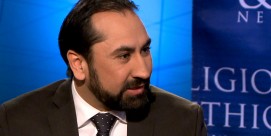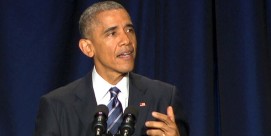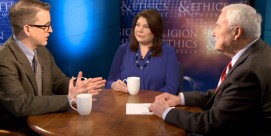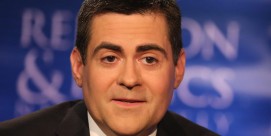Harold Dean Trulear: Learning Political Wisdom
Massachusetts Governor Deval Patrick offered a curious contrast in his Democratic Convention speech earlier this week. He deemed Senator Barack Obama a man of vision and compared him to the policies and programs of the Bush administration. He concluded that America needs vision, not “more policies and programs.”
Such a sentiment almost came across as an apology for a candidacy that has been plagued by criticism of “lack of substance,” and “celebrity politics” from its inception. In addition, Patrick’s contrast set up an antithetical relationship between vision and policy that is both unnecessary in government and foreign to religious tradition.
Biblical prophets cast vision and proposed policy. They offered apocalyptic hopes for future (and current) generations and brought clear indictment to failed policies for the poor, while proffering concrete practices consistent with such vision. People need hope and structures that enact those hopes. People require proscriptive vision and prescriptive vehicles. When Martin Luther King proclaimed his dream 45 years ago from the steps of the Lincoln Memorial, he was careful to document policy issues such as states’ rights and the statecraft of federal government (critiquing charges of “interposition and nullification” from southern states) in his journey to the demographically diverse mountaintops from which freedom should ring.
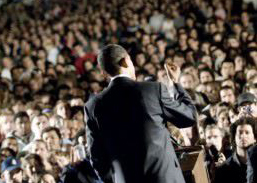 Last night’s speech was Obama’s great opportunity to show that vision and policy do not live in separate worlds. Indeed, his speech needed to reflect the appropriate balance of what African-American Christian ethicist Peter Paris has called the “political idealism” and “political realism” that combine to form “political wisdom.” Political realism without vision becomes crude pragmatism. Political idealism without political realism degenerates into irrelevancy and a disconnected otherworldliness. In the prophetic tradition, the best of a prophet’s otherworldly offerings set the context for change in this life. Could Obama pull this off?
Last night’s speech was Obama’s great opportunity to show that vision and policy do not live in separate worlds. Indeed, his speech needed to reflect the appropriate balance of what African-American Christian ethicist Peter Paris has called the “political idealism” and “political realism” that combine to form “political wisdom.” Political realism without vision becomes crude pragmatism. Political idealism without political realism degenerates into irrelevancy and a disconnected otherworldliness. In the prophetic tradition, the best of a prophet’s otherworldly offerings set the context for change in this life. Could Obama pull this off?
We got the hope, we got the vision. And yes, the “policies and programs” deemed antithetical to vision earlier in the convention came rushing in amidst the framework of Obama’s campaign ideals. Tax cuts for 95 percent of working Americans, equal pay for equal work, investment in support for members and veterans of the armed forces and their families, development of alternative energy sources, and commitment to investment in education from early childhood through college came rolling down like waters. Fair treatment of gay and lesbian relationships, a relentless pursuit of Al-Qaeda, accessible health care for all Americans, and protection of workers’ pensions before CEO bonuses came rushing as a mighty stream. The policy came through — and then the return to vision.
That return expressed itself in a commitment to a form of debate that seeks common ground on the problems we face. The new politics pressed calls for reasoned debates among those who disagree on how to handle unwanted pregnancy, same-sex unions, and other issues that have drawn a fundamentalist stridency from all sides. Obama appealed to a democratic spirit of rigorous debate and discussion and to the common purpose at the root of the American dream.
The speech was not perfect, nor all of the answers emotionally satisfying for this observer. As an African-American Republican whose party affiliation predates the right-wing hijacking of the party, I still have views of policy that differ greatly from Obama’s. As an evangelical Christian, I am diametrically opposed to his views and votes on how to deal with unwanted pregnancies and same-sex unions. But I am all for the need for a different style of debate and statecraft, even if some of Obama’s own behaviors, such as dissing and ditching Jeremiah Wright, reflect the old politics of expediency. And I will vote for him.
I will vote for him because of the hope for a new form of debate and a commitment to some of the policy proposals he has advanced. And I will vote for him because he is Black. That may seem heretical in a “post-racial” society, but I am not alone in saying that post-racial is not a-racial. To be truly post-racial is not to deny the history and realities of race, but to remember and think of them differently. Forgiveness, in the biblical tradition, does not mean to forget what has happened, but to overcome the bitterness inflicted and to remember the pain of the past in ways that empower the future — to use them as occasions to rise above the hurt and seek justice that precludes others from past pains made present.
And so I remember the pain of slavery, segregation, and discrimination. I remember the national consensus on denied opportunities to minorities that led to Thurgood Marshall prodding a judicial activism in 1954, because legislation would never lead to justice as long as electoral politics reflected a national culture of racism. I remember being a child of the ’60s and believing that if a Black man were ever elected president, it would be in 2000 or 2020 because, at the time, every president from Harrison in 1840 to Kennedy in 1960 who had been elected in a year divisible by 20 had died in office (and I couldn’t get it out of my mind last night as I watched the speech that someone might shoot Obama before my eyes on national television; I let out a sigh of relief when he was finished).
I will vote for him because I choose to remember the racial past differently, for only then can we envision a post-racial America where the oppression of the past becomes a springboard for courageous living in the future. The new terms of the debate proposed last night give me that opportunity. We have the opportunity to live in Paris’s notion of political wisdom for the first time in a generation.
Harold Dean Trulear is associate professor of applied theology at the Howard University School of Divinity.



